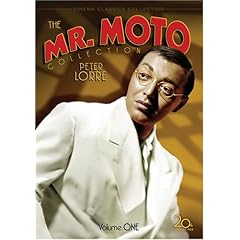 Mr. Moto initially was more or less a Japanese knock-off of Charlie Chan, whose print adventures were hugely popular in The Saturday Evening Post. Author John Marquand helped feed the appetite for inscrutable oriental adventurers by creating Mr. Moto, originally a civilian crime fighter and later an international police officer.
Mr. Moto initially was more or less a Japanese knock-off of Charlie Chan, whose print adventures were hugely popular in The Saturday Evening Post. Author John Marquand helped feed the appetite for inscrutable oriental adventurers by creating Mr. Moto, originally a civilian crime fighter and later an international police officer.
In time, a gigantic number of Chan movies began to be churned out, starring several actors and produced at several studios (with shoestring poverty row company Monogram taking over the series after it lost most of its box office luster). In the end, I think there were something like 42 Chan movies made over a roughly twenty-year span.
Naturally, several knock-off characters followed, resulting in such sights as Boris Karloff (!) playing the Oxford educated Mr. Wong in five cheapie movies. A somewhat more upscale series, however, featured German émigré Peter Lorre as Marquand’s Mr. Moto. Lorre at first was pleased to play a good guy, rather than his trademark sinister characters, but tired of the increasingly perfunctory entries as he was forced to grind out eight Moto movies over the next two years. Nor were things helped by Lorre’s then chronic efforts to kick his morphine addiction. On a later picture, a director asked Lorre how he managed to keep churning out the (to him) desultory Motos. “I was on dope,” Lorre replied. He wasn’t kidding.
Think Fast, Mr. Moto was the first Moto movie, however, and Lorre was still in a good humor about it. The German actor, with his lisping European accent, was an odd choice to play the Nipponese Moto (although Warner Oland, the best of the Chans, was Swedish), and probably was mostly cast because of his diminutive size. Lorre forwent make-up such as fake eye-folds, moreover, and relied on his size, performance and a pair of wire rim glasses to sell his character’s ethnicity.
The first movie plays Moto a bit mysteriously, and it’s not until the end that his good guy status is confirmed. I assume later on in the series he became a more standard sort of cop, ala Chan. However, if Chan was a fox in the Columbo mold (or vice versa, actually), Moto is more of a cobra, waiting passively and then suddenly striking with deadly effect. Moto probably kills more people in this movie than the gentle Chan did in his 40 movies put together, assuming he ever actually killed anyone. Indeed, at least once Moto more or less just murders a guy, even if the latter had it coming. Moto certainly brawls more, being a master of Judo, and is apt to don elaborates disguises and going undercover.
Another difference is that while Moto assume assumes a Chan-like humbleness, he seems (perhaps due to Lorre, who knew what it was like to find himself surrounded by Americans) to be more playing at it than Chan did, and seems alternately amused and annoyed at how his race has him treated by blustering whites.
The plot, about a smuggling ring, is the normal piffle, and way too much time is spent on a typically boring romance between two typically callow leads. An odder note is that the villains are played by actors at least now more associated with comedy. The ringleader is played by Sig Ruman, who played a foil for the Marx Brothers in several of their comedies. His chief henchman, meanwhile, was played by an actor best known for his comic mugs. Sharp-eyed viewers, meanwhile, will spot J. Carrol Naish (House of Frankenstein) as a shopkeeper early on.
The first Mr. Moto, at least, is a fun way to kill an hour, and indeed the eight pictures all clocked in at around 60 to 70 minutes. Viewers with a horror of exaggerated ethnic characters obviously might want to give these a pass, but if you can get past that aspect and enjoy old detective movies, you might want to give these a look.
A first box set of Motos, with the initial four films, has just come out on DVD. They have been extensively cleaned up, and look pretty good for ‘B’ flicks from this period. The DVD for Think Fast, Mr. Moto also features a documentary on Harvey Parry, the stuntman who did all the rough stuff in lieu of the delicate, awkward Lorre. For what it’s worth, he was a great stand-in for Lorre. Despite looking for the insertion of a stuntman (and in a near crystal clear digital picture) during the fight scenes, I couldn’t always tell when one was being used.
